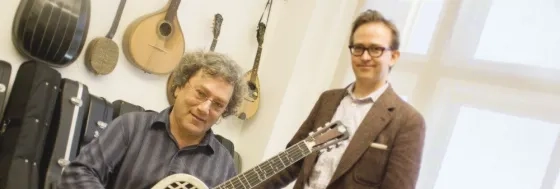David Tanenbaum Interview
Interview Date: February 2 and 5, 2016
Conservatory Affiliation: Chair of Conservatory Guitar Department
Interviewer: Sam Smith
David Tanenbaum has performed in more than 40 countries and has been guest soloist with the San Francisco Symphony, Los Angeles Philharmonic, Minnesota Orchestra and others. He has worked tirelessly to expand the guitar repertoire, and composers such as Hans Werner Henze, Terry Riley, Lou Harrison and Aaron Jay Kernis have dedicated pieces to him. His more than three dozen recordings can be found on EMI, Nonesuch, Rhino, GSP, New Albion, Stradivarius and other labels. Tannenbaum's most recent release is Awakenings: New American Chamber Music for Guitar on Naxos, for which he conducts the Conservatory Guitar Ensemble. He has produced many editions of guitar music, including the David Tanenbaum Concert Series for Guitar Solo publications. He has also written a series of three books, The Essential Studies, which analyzes the études of Sor, Carcassi and Brouwer and complements his recordings of those works on GSP. His chapter on "The Classical Guitar in the 20th Century" appears in the Cambridge Companion to the Guitar. His website is www.davidtanenbaum.com.
Topics
Family and early years
Rolando Valdes-Blain
Aaron Shearer
San Francisco and the Conservatory as a student
Segovia master class, 1981
Competitions
Joining the Conservatory faculty
Performing Steve Reich's Electric Counterpoint
Guitar curriculum
Teaching style
Conservatory guitar faculty
Harris Guitar Foundation
Students
Conservatory's move to Oak Street, 2006
Collaborations with composers (Lou Harrison, Toru Takemitsu, etc.)
Collaborations with instrumentalists and ensembles
Performance style
Guitar ensembles and organizations
Tours and recordings
Audio
Elias and Mary
Early musical influences
Segovia master class
Lou Harrison
Toru Takemitsu
Advice
